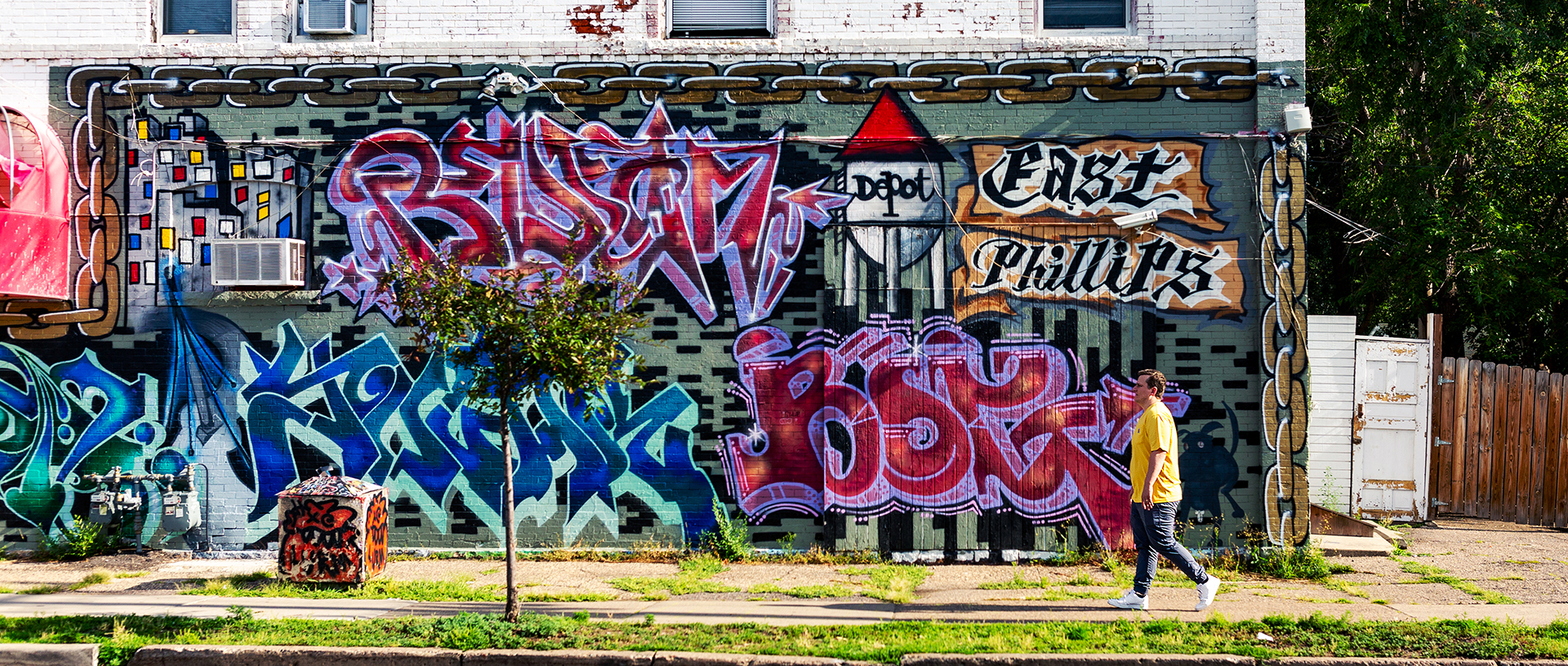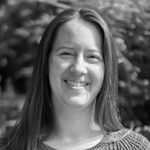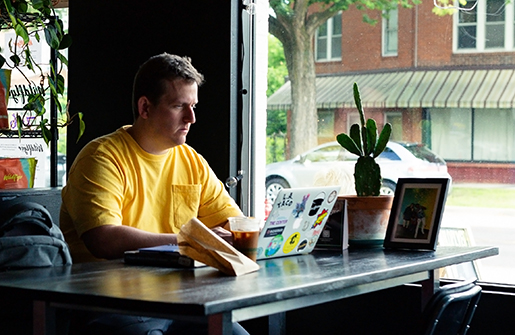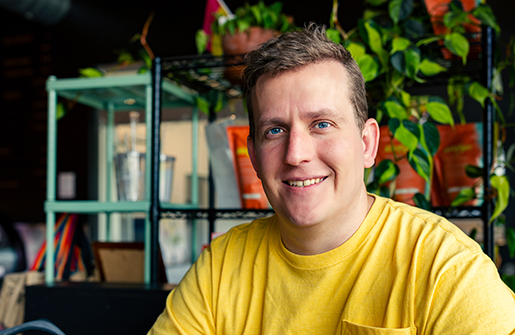
Many Christians want to know what they can do to help unhoused people. We see that widespread homelessness is an ever-growing problem, and we want solutions. We want someone to tell us what we should do when we walk by an unhoused person on the street. But for nonprofit housing director, writer, and advocate Kevin Nye (MDiv ’16), the answers to these questions do not transfer easily from one housed person to another. “I want to inspire people to action,” Kevin tells me, “but I don’t want to be prescriptive about what that action looks like.”
Kevin wants Christians to become educated about the issues involved. He’s a passionate advocate for policies that have been shown to best serve unhoused people: housing first, harm reduction, and trauma-informed care. “There’s so much to know that gets confused—or intentionally discombobulated—to benefit some people over others,” Kevin says. “There are a lot of myths out there that need direct confrontation.” People may claim, for example, that poverty is caused by lack of effort or that addiction treatment should be required before housing assistance is offered. In his book, Grace Can Lead Us Home: A Christian Call to End Homelessness, Kevin dives deep into policy myths and best practices, based on both research and his own experience working in homeless ministry.
But the specifics of what to do? That depends on the person, on the communities we’re a part of, and on the experiences of unhoused people in our cities. The key, according to Kevin, is proximity. If someone is asking how to get on the right path, the first thing to do, Kevin says, is to “get in relationship and community” with people experiencing homelessness; then, “listen to what they’re saying and do that.”
Kevin aims to invite housed Christians into “solidarity and communion with people who are experiencing homelessness.” Much of his work has involved creating spaces where people can do just that. For unhoused and housed people to meet and build authentic relationships, Kevin says, “you have to create spaces where everyone feels safe to be themselves.” And he means truly everyone—both people experiencing homelessness and the staff and volunteers who show up with the intention of serving. Unhoused people are already in a vulnerable position, Kevin explains. After all, “asking for help is the most vulnerable thing you can do.” People who show up to serve have to meet them there in that vulnerability—human to human, equal to equal. There’s no “I’m of this type and you’re of this type.” We’re all just human, together.

Liz Cooledge Jenkins is a Seattle-based writer and the author of Nice Churchy Patriarchy: Reclaiming Women’s Humanity from Evangelicalism.

Lindsey Sheets is photographer, video editor, and colorist for FULLER studio.
Many Christians want to know what they can do to help unhoused people. We see that widespread homelessness is an ever-growing problem, and we want solutions. We want someone to tell us what we should do when we walk by an unhoused person on the street. But for nonprofit housing director, writer, and advocate Kevin Nye (MDiv ’16), the answers to these questions do not transfer easily from one housed person to another. “I want to inspire people to action,” Kevin tells me, “but I don’t want to be prescriptive about what that action looks like.”
Kevin wants Christians to become educated about the issues involved. He’s a passionate advocate for policies that have been shown to best serve unhoused people: housing first, harm reduction, and trauma-informed care. “There’s so much to know that gets confused—or intentionally discombobulated—to benefit some people over others,” Kevin says. “There are a lot of myths out there that need direct confrontation.” People may claim, for example, that poverty is caused by lack of effort or that addiction treatment should be required before housing assistance is offered. In his book, Grace Can Lead Us Home: A Christian Call to End Homelessness, Kevin dives deep into policy myths and best practices, based on both research and his own experience working in homeless ministry.
But the specifics of what to do? That depends on the person, on the communities we’re a part of, and on the experiences of unhoused people in our cities. The key, according to Kevin, is proximity. If someone is asking how to get on the right path, the first thing to do, Kevin says, is to “get in relationship and community” with people experiencing homelessness; then, “listen to what they’re saying and do that.”
Kevin aims to invite housed Christians into “solidarity and communion with people who are experiencing homelessness.” Much of his work has involved creating spaces where people can do just that. For unhoused and housed people to meet and build authentic relationships, Kevin says, “you have to create spaces where everyone feels safe to be themselves.” And he means truly everyone—both people experiencing homelessness and the staff and volunteers who show up with the intention of serving. Unhoused people are already in a vulnerable position, Kevin explains. After all, “asking for help is the most vulnerable thing you can do.” People who show up to serve have to meet them there in that vulnerability—human to human, equal to equal. There’s no “I’m of this type and you’re of this type.” We’re all just human, together.
Liz Cooledge Jenkins is a Seattle-based writer and the author of Nice Churchy Patriarchy: Reclaiming Women’s Humanity from Evangelicalism.
Lindsey Sheets is photographer, video editor, and colorist for FULLER studio.


When Kevin served as a front-line worker at The Center in Hollywood, California, relationship-building often happened through a coffee hour where unhoused people could come, take a load off, grab a warm beverage, and spend time connecting with one another and with housed folks in an atmosphere of dignity. In Grace Can Lead Us Home, Kevin writes about an unhoused man named Mark who showed up regularly to coffee hour in total silence, only sharing his name with staff after several months. “Many programs,” Kevin writes, “may not have allowed Mark to enter without giving his name.” But at The Center, at coffee hour, Mark could be silent when he needed to be silent and speak when he was ready to speak. And, after a long time, he did begin to speak; sometimes “ask[ing] thoughtful questions” in group discussions, and other times “recount[ing] in near perfect detail the plots of movies he watched at the library.” Mark eventually accepted healthcare services with great enthusiasm. But first, he needed time to just be.
In Hollywood, working directly with unhoused adults, Kevin spent his time offering people services while simultaneously building relationships of trust. He recalls building a friendship with one unhoused person there over a shared love of Marvel movies. This sort of real, mutual relationship is powerful. Through the friendships Kevin built, people sometimes eventually accepted some of the services offered, even if they refused at first. Other times, as people got to know Kevin and trust him, they started to tell him what they actually needed—even if that didn’t line up with what The Center initially offered.
These days, Kevin’s job—as the housing director of YouthLink, an organization addressing youth homelessness in Minneapolis—is less front-line, but the underlying principles haven’t changed. He still spends time with the young people YouthLink serves whenever he can, building relationships marked by dignity and mutuality. Now that this is no longer his primary job description, it “requires an extra level of intentionality,” but the effort is worth it. Kevin says, “I have to make sure for my own integrity and mental health that I’m still present and spending time with the people we’re serving.” Some days, Kevin finds himself duking it out at foosball with the youth—putting to work the skills he developed during his own youth group era. Other days, he makes time to play Yahtzee with a young person who enjoys the game as much as he does.
For Kevin, it’s a matter of “finding shared joys.” Whether Marvel movies or Yahtzee, these mutual interests humanize us; they bear witness to our shared humanity in a world where unhoused people and housed people rarely have positive interactions with one another and might seem to have nothing in common.
Ultimately, in both his nonprofit work with unhoused people and his advocacy work with churches, Kevin seeks to break down the barriers between “helper” and “helpee.” If housed people want to build relationships with unhoused people, Kevin says, housed people have to “set aside their social position and the safety that gives them, and the barrier that creates.” As an educated white man, Kevin wrestles with his own social position as he spends time speaking with church groups about homelessness. He recognizes the complexities of his chosen role as spokesperson. Actively inviting others to hold him accountable, he hopes to advocate in a way that is “validating and affirming of the experience of people who have experienced homelessness and the people who work with them.” He is passionate about the issues involved but never wants to make himself the center of the story. People experiencing homelessness are “the experts of their own experience,” he says. “They are the ones who know what they need on an individual level and a collective level.”
For those of us who are not experiencing homelessness, then, it’s a matter of learning to listen. “Transformation and progress,” Kevin has learned, “have to be mutual.”
For unhoused young people, transformation might look especially dramatic. Kevin sees “the amount of life [these youth have] left ahead of them to bounce back and build a different trajectory.” He tells me his dream for the unhoused youth he works with: that one day they will be playing “two truths and a lie,” and they’ll say they were homeless for a while when they were 19, and “people will think that’s the lie.” People won’t believe that this was part of someone’s life story. The transformation was that monumental.


It turns out that momentous transformation is not just for the young people Kevin works with; it’s for him, too. Over the years, as Kevin has built relationships with unhoused people, his theology has expanded dramatically. Kevin reflects, “When I first came into this work, I thought all of my theological and biblical education—and all that—was going to shape the way I do this work.” And in a sense, this has been true: Kevin’s coursework at Fuller certainly broadened his sense of God’s work in the world—such that he came to understand his work in homelessness as part of his call to ministry, not separate from it. His studies shaped his sense of vocation. But at the same time, Kevin found something else to be “even more true.” He says, “Doing this work changed how I do theology, how I read Scripture, and how I understand God.”
Working with unhoused people has changed Kevin. It has made him less interested in theologies centered in an academic world that doesn’t have much to say to people on the streets. The theologies he’s interested in now are ones that speak to unhoused people’s experiences in a tangible way. Because of the relationships he has built, Kevin finds himself “drawn to liberation theologies, because they offer a hope that’s based in community and based in the hearts and experiences of the marginalized.”
Kevin calls Christians toward this community-based hope. He invites us to expand our ideas of who our neighbor is, of whom we belong to, of what fellowship can look like. There are many things we can’t change, but we can—and must—live in ways that honor the dignity of every human being, especially those whose dignity so often goes unrecognized. Kevin doesn’t pretend this work is easy. But he keeps pursuing his calling to help unhoused youth see a good and healing path forward in their lives, and to help housed churchgoers see a good and healing path toward a different kind of relationship with unhoused folks.
Kevin won’t tell Christians exactly what to do. But he invites us to break down the helper/helpee divide. He encourages us to find shared joys, embracing our common humanity. And he lives his life as a model of mutual transformation.
Guided by her passion for God and her love for music, Sunita Puleo (MAICS ’17) builds bridges among people of different cultures with the power of story and song.